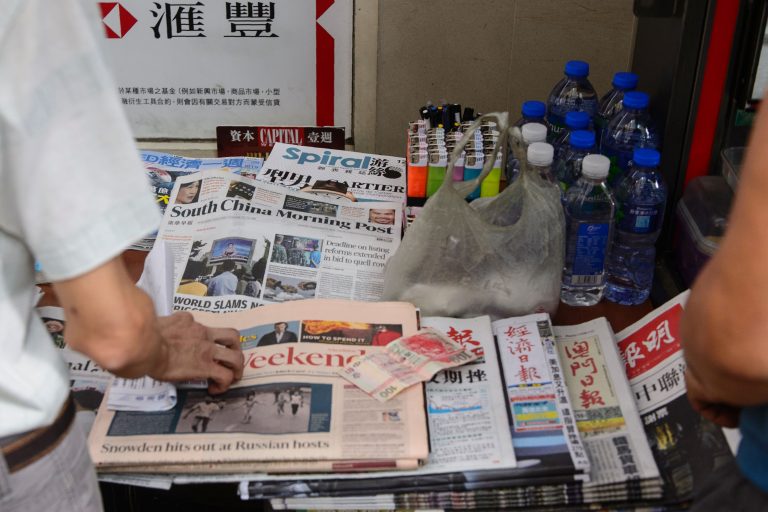The Chinese Communist Party (CCP) has quietly installed its own directors into key positions at a leading Chinese-language broadcaster in Hong Kong further expanding its media influence in the embattled city, the Ming Pao newspaper reported.
Directors Fu Weizhong and Li Jiping were replaced in February at Phoenix Media Investment (PMI) with Sun Guangqi, Gong Rui and Wang Kai, three individuals with suspected deep ties with Beijing. Sun once led the Economic Construction Department at the Ministry of Finance in China and Gong and Wang both have Beijing addresses indicating they had once worked for the central government in Beijing, reported Ming Pao.
In April, Liu Changle, chairman of the Hong Kong-based Chinese-language broadcaster, PMI, announced he would be selling the majority of his stake in the company to CCP-backed Bauhinia Culture Holdings and to Common Sense. Both companies are owned by Pansy Ho’s Shun Tak empire.
The new directors have also been recruited to head Bauhinia, suggesting a higher degree of direct control from Beijing.
A former professor of political science at the City University of Hong Kong, Joseph Cheng said, “The new appointee is at least equal in rank to the person in charge of the propaganda department at the Central Liaison Office, but he has a slight advantage in rank because he is from Beijing,”
Phoenix Media Investment sold at a discount
Success
You are now signed up for our newsletter
Success
Check your email to complete sign up
Liu Changle, founder of Phoenix Media Investment agreed to sell his stake in the company in two deals for a total of HK$1.156 billion (US$149.2 million).
In a filing with the Hong Kong stock exchange it indicated that Bauhinia bought a stake in the company worth HK$640 million (US$82.397 million) and Shun Tak, owned by Common Sense, purchased shares worth HK$516 million. The stakes were purchased at a 21.8 percent discount from the then closing price of 78 HK cents per share.
PMI stated in their filing that “The board does not expect the proposed (shares transfers) will have any negative impact on the business operations of the company,”.
The transaction comes at a time when media companies are grappling with intense competition for advertising dollars. Last year, PMI posted a net loss of US$133.8 million and an operating loss of HK$502 million an improvement over an operating loss of HK$728 million in 2019. The shrinking operating loss in 2020 was the result of cost-cutting measures enacted in 2019.
The CCP’s ever-expanding influence
Nearly 24 years after Hong Kong was reverted to China from British colonial rule, Beijing now controls more than 80 percent of the city’s publishing industry.
In 2015, The Central Liaison Office took control of Sino United Publishing Ltd. the owner of three major bookstore chains in Hong Kong, Chung Hwa Book Co., Joint Publishing HK and the Commercial Press and, with these recent changes, has tipped the balance of influence further in their favor.
The Central Liaison Office boasts control of several Chinese-language media assets in the city including the Wen Wei Po, Hong Kong Commercial Daily, and Ta Kung Pao, in addition to the online Orange News.
Hong Kong independent journalist Gao Yu said, “they will need to set up CCP cells [in those companies] and start editing textbooks to send a unified [CCP-backed] message.”
Gao said, “Without the two remaining outspoken publications like Apple Daily and The Epoch Times, [Hong Kong media] will be in exactly the same situation as media in mainland China,”
She believes that the traditional freedoms allowed Hong Kong have been removed and that “It is now totally one country, one system.”
Last June, the CCP imposed a National Security Law on Hong Kong that bans a broad spectrum of expression and activity considered to be subversive, with the maximum penalty from violations being life imprisonment.
Chinese journalist Huang Yongqiang is on record stating that “the central government recently took over full control of the police force in Hong Kong, and now they are moving in with the pen, sparing no effort in the culture and propaganda sectors.”
Media control
Having ruled mainland China for over 70 years, the CCP operates one of the most restrictive media environments on the planet. While, on paper, China affords its citizens freedom of speech and press, in practice the reality is much different.
The regime has a history of shuttering publications and websites that publish media that clashes with the regime’s message. Journalists, bloggers, and activists are regularly jailed and the CCP use libel lawsuits and intimidation to influence media organizations to censor themselves.
The Communist Party’s propaganda department distributes censorship guidelines to editors and media providers on a weekly basis and employs numerous government bodies to enforce laws related to media publication.
Millions of workers employed as “public opinion analysts” by the government and private companies constantly monitor the internet for posts that run afoul of the official party message. The CCP is particularly interested in blocking any communication that could potentially incite social and civil unrest, deleting any communication that threatens political stability.














